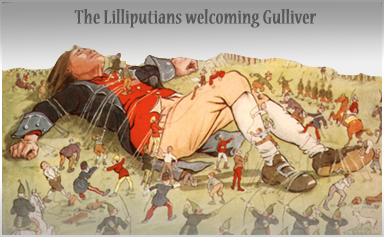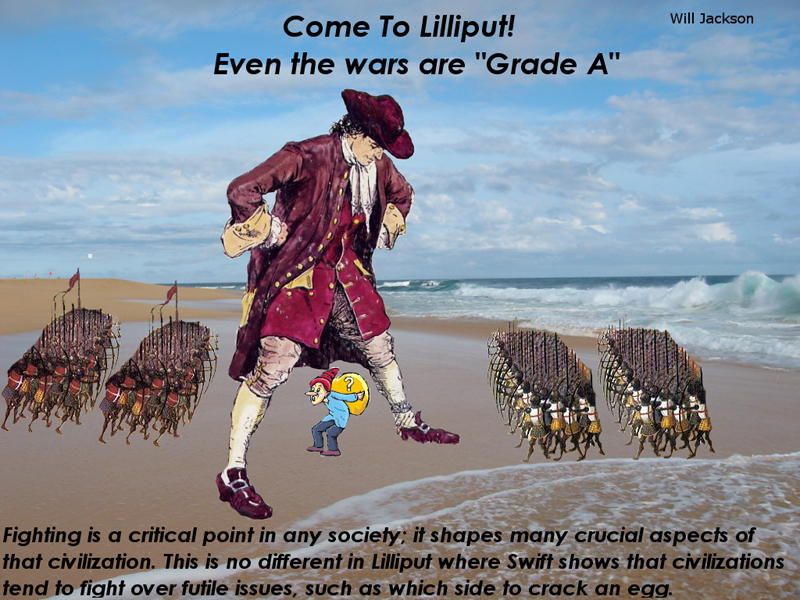

Lilliput
A small stature has many advantages. The perception
is that smallness implies a cute, harmless, and loving disposition. At a glance, one assumes the same thing about the Lilliputians. This view is altered when reality sets in. The Lilliputians act as a savage society marred by political corruption and brutal behaviors. The Lilliputians do not display the capabilities of resolving any conflict and result to violence to settle disputes, which Swift uses to show the corruption and lifestyle of this time.
The Lilliputians are neither resolute nor compromising. They find differences in each other for argument’s sake. The political parties are based on the preference to wear high or low heels. Z.S. Fink states, “Book one is more than an attack on the Tories and Whigs but a satire on political parties in general. However much he espoused from the Tory opinion from his situation of his own day, he could not keep from seeing that from larger point of view High Heels and Low Heels were alike and the causes which divided them trivial”(156). The Lilliputians could be a united and peaceful society if not for one thing - the size of a heel, but they refuse to compromise.
Swift represents relationships between France and England through Gulliver’s journeys to Lilliput and Blefuscu. The counties are at war and show no sign of stopping , but Gulliver somehow establishes peace between them. William Pencak suggests that Gulliver symbolizes a peacemaker between England and France by saying “He signifies Lord Bolingbroke, the statesman who made peace between England and France in 1713 yet was forced to flee on charges of treason: Gulliver and Bolingbroke are beneficiaries to their kingdoms yet suffer exile and execrations through the manipulations--in the Travels literally--of much smaller men” (1). After Gulliver establishes peace between the two, the Lilliputians exile him because they cannot handle the idea of peace. There must be constant conflict and a showing of a real life parallel to what happened. This alone makes the argument much more compelling.
Arguably the most brutal society in history was Sparta, an ancient Greek society that focused on military force and intimidating others. William Halewood suggests a relationship between the Spartans and Lilliputians. When it came to raising children in Sparta, Halewood states “it [was] illegal for the father to bring up the child in his own fancy and Spartan nurses were instructed neither to expose them to any type of meat, not be afraid in the dark, or be alone, nor to be wayward, and peevish, and crying, as they generally are in other countries the impertinent care and fondness of those who look to them.”(424). The Spartan method of raising children displays harsh treatment such as not allowing them to be around the parents, and also by stressing toughness at such a young age. This is similar to how Lilliputians raise children. Swift writes “They will never allow that a child is under any obligation to his father for begetting him-a professor will not allow whispers, or use any fondling expressions, or bring any presents, or sweetmeats”(2).
Will Jackon's interpretation of Lilliput
displayed as a poster
(Click poster for a larger image)
-----------------------------------------------
<--Back to home
Get a Plot Summary
View Concept Map
The perception of being small, classy, and harmless is not upheld by the Lilliputians. Gulliver temporarily puts the fighting to a halt between the Lilliputians and Blefuscians; shortly after, the Lilliputians exile him because they cannot tolerate the idea of having something resolved peacefully. One cannot ignore the fact that the Lilliputians are incredibly brutal and mirror many aspects of the Spartan civilization. These characteristics conflict the perception one would receive from a small group of people; the reality is that they are brutal, savage, and politically unstable.

